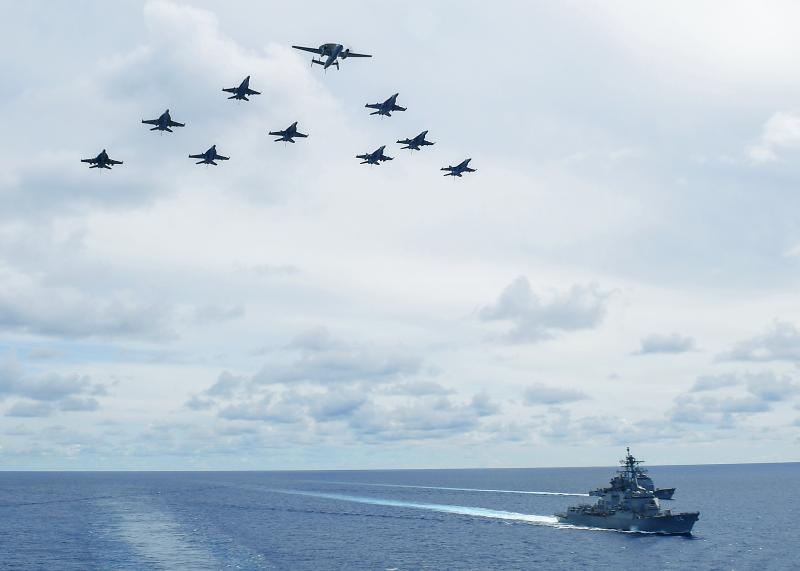A US Navy destroyer yesterday sailed through the Taiwan Strait to show Washington’s “commitment to a free and open Indo-Pacific,” the Seventh Fleet of the US Indo-Pacific Command said in a statement.
The Arleigh Burke-class guided missile destroyer USS Ralph Johnson was conducting a routine transit through international waters, the fleet said.
“The ship’s transit through the Taiwan Strait demonstrates the United States’ commitment to a free and open Indo-Pacific,” Seventh Fleet spokesperson Nicholas Lingo said in a statement. “The United States military flies, sails and operates anywhere international law allows.”

Photo: EPA-EFE
The Chinese Ministry of National Defense did not immediately respond to a faxed request for comment.
Taiwan’s Ministry of National Defense confirmed the transit, saying in a statement that the military had a full grasp of the situation as the US warship sailed through the Strait northward, and did not spot any irregularities.
According to the US military, the last time the US Navy conducted a similar navigation was on Jan. 22, when the USS Dewey (DDG-105), an Arleigh Burke-class guided missile destroyer, sailed through the Strait.
US Navy ships routinely sail through the Taiwan Strait, but yesterday’s transit came as the crisis in Ukraine continues to unfold.
Taiwan is in a heightened state of alert due to Russia’s invasion of Ukraine, nervous that China might try to take advantage of the situation to make a move on the nation, although the government has reported no unusual Chinese maneuvers.
The air force last night said that eight Chinese military aircraft had entered the nation’s southwestern air defense identification zone earlier in the day.
Taiwan responded by dispatching planes to monitor the Chinese aircraft, issuing radio warnings and mobilizing air defense assets, it added.
China has sent record numbers of military aircraft into Taiwan’s air defense identification zone over the past two years.
Beijing says Taiwan is the most sensitive and important issue in its relations with Washington.
A growing number of US allies have transited the Strait as Beijing intensifies its military threats toward Taiwan and solidifies its control over the disputed South China Sea.
British, Canadian, French and Australian warships have all passed through the Strait in the past few years, sparking protests from Beijing.
Collin Koh, a research fellow at Singapore’s S Rajaratnam School of International Studies, keeps a database of declared US transits through the Strait.
Nine were conducted in 2019, followed by 15 in 2020 and 12 last year. So far this year there have been two, including the USS Ralph Johnson crossing.
Additional reporting by Wu Su-wei and AFP

TRAGEDY STRIKES TAIPEI: The suspect died after falling off a building after he threw smoke grenades into Taipei Main Station and went on a killing spree in Zhongshan A 27-year-old suspect allegedly threw smoke grenades in Taipei Main Station and then proceeded to Zhongshan MRT Station in a random killing spree that resulted in the death of the suspect and two other civilians, and seven injured, including one in critical condition, as of press time last night. The suspect, identified as a man surnamed Chang Wen (張文), allegedly began the attack at Taipei Main Station, the Taipei Fire Department said, adding that it received a report at 5:24pm that smoke grenades had been thrown in the station. One man in his 50s was rushed to hospital after a cardiac arrest

PUBLIC SAFETY: The premier said that security would be tightened in transport hubs, while President Lai commended the public for their bravery The government is to deploy more police, including rapid response units, in crowded public areas to ensure a swift response to any threats, President William Lai (賴清德) said yesterday after a knife attack killed three people and injured 11 in Taipei the previous day. Lai made the remarks following a briefing by the National Police Agency on the progress of the investigation, saying that the attack underscored the importance of cooperation in public security between the central and local governments. The attack unfolded in the early evening on Friday around Taipei Main Station’s M7 exit and later near the Taipei MRT’s Zhongshan

ON ALERT: Taiwan’s partners would issue warnings if China attempted to use Interpol to target Taiwanese, and the global body has mechanisms to prevent it, an official said China has stationed two to four people specializing in Taiwan affairs at its embassies in several democratic countries to monitor and harass Taiwanese, actions that the host nations would not tolerate, National Security Bureau (NSB) Director-General Tsai Ming-yen (蔡明彥) said yesterday. Tsai made the comments at a meeting of the legislature’s Foreign Affairs and National Defense Committee, which asked him and Minister of National Defense Wellington Koo (顧立雄) to report on potential conflicts in the Taiwan Strait and military preparedness. Democratic Progressive Party (DPP) Legislator Michelle Lin (林楚茵) expressed concern that Beijing has posted personnel from China’s Taiwan Affairs Office to its

SAFETY FIRST: Double the number of police were deployed at the Taipei Marathon, while other cities released plans to bolster public event safety Authorities across Taiwan have stepped up security measures ahead of Christmas and New Year events, following a knife and smoke bomb attack in Taipei on Friday that left four people dead and 11 injured. In a bid to prevent potential copycat incidents, police deployments have been expanded for large gatherings, transport hubs, and other crowded public spaces, according to official statements from police and city authorities. Taipei Mayor Chiang Wan-an (蔣萬安) said the city has “comprehensively raised security readiness” in crowded areas, increased police deployments with armed officers, and intensified patrols during weekends and nighttime hours. For large-scale events, security checkpoints and explosives